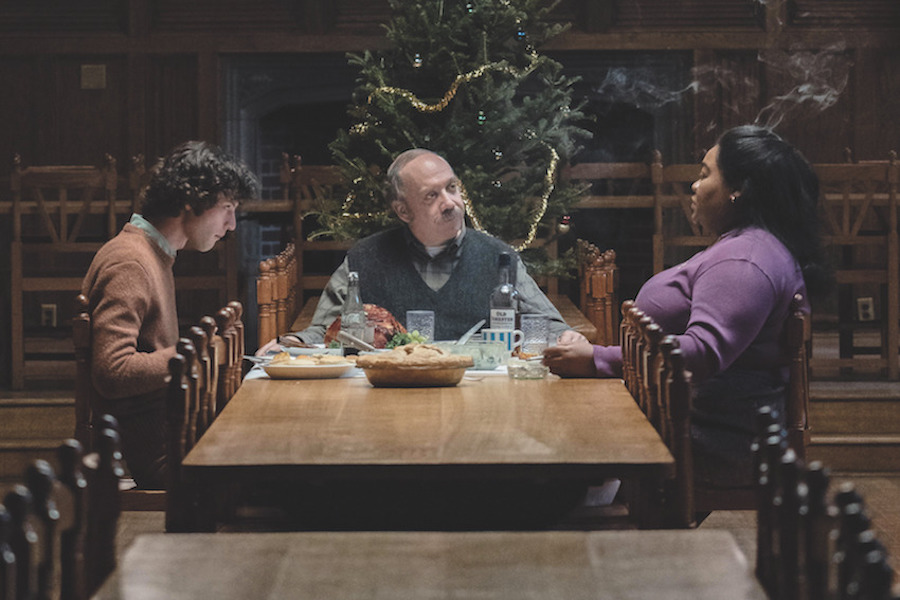For Angus Tully (newcomer Dominic Sessa), Christmas 1970 is off to a bad start. The bright, kind but troublemaking teen has just learned that his mother is nixing the family’s Caribbean vacation to go on an overdue honeymoon with his stepfather. As a result, Tully will be stuck on campus — Barton Academy, the fancy New England prep school he attends as a junior — for two weeks while his classmates hit the slopes or travel abroad with their loved ones.
But Tully won’t be alone. Acting as a glorified babysitter is Barton’s loathsome history teacher, Paul Hunham (Paul Giamatti, in one of his best roles). The aging instructor’s gleeful contempt for his students does nothing to mask his monotonous existence. Tully thinks Hunham’s outlook is cruel and unproductive. Hunham thinks Tully and the rest of his upper-class ilk — whom he describes as “lazy, vulgar, rancid little philistines” — were born lucky but fail to appreciate their privileges.
You may unsubscribe from any of our newsletters at any time.
Melancholic Christmas stories are nothing new, of course. From Charles Dickens’s A Christmas Carol to Frank Capra’s It’s a Wonderful Life, the world’s most famous holiday tales are heart-tugging yarns with robust character arcs and digestible social messages. The Holdovers certainly has its touching moments, but it is much more interested in capturing the spirit of American movies from the ’70s — in both form and character — than replicating the Christmas stories of yore.
More on Broadview:
- Sufjan Stevens’ latest album, Javelin, is a soulful ode to queer romance, faith and grief
- Quilting exhibition celebrates Nova Scotia’s Black communities
- ‘Satan Wants You’ revisits the ritual abuse scare of the ’80s and ’90s
Director Alexander Payne’s latest work is peppered with retro production logos, slow dissolves, crash zooms and grainy visuals. He reportedly screened Paper Moon and The Last Detail — both released in 1973 — for his cast and crew. And his use of “The Wind” by Cat Stevens firmly places The Holdovers alongside 1971’s Harold and Maude, another odd-couple dramedy that employed the English folk star’s music to powerful effect. Payne’s embrace of this lauded era of filmmaking finds a mirror in the plot: the flawed characters of The Holdovers also can’t escape the shadow of the past.
“Each generation thinks it invented debauchery or suffering or rebellion,” Hunham tells Tully late in the film. “If you truly want to understand the present — or yourself — you must begin in the past.” Tully’s aimlessness stems from a traumatic family event, which Payne teases bit by bit. Hunham is wracked with insecurities over his early career and romantic failures. Joining the men as a third holdover is Mary Lamb (Da’Vine Joy Randolph), the school cook and a reminder of the chaotic world outside Barton’s peaceful bubble. Lamb cannot come to grips with the death of her son, Curtis, a Barton grad who didn’t have money for college, was called up to Vietnam and never made it back home.
Want to read more from Broadview? Consider subscribing to one of our newsletters.
In keeping with the ’70s movies Payne mostly succeeds in emulating, the characters reach the credits with nearly all of their problems intact, but with a few lessons learned. Christmas isn’t the point — it’s just a backdrop to explore their hopes and fears. Perhaps that’s the key to making a good Christmas film: never intending to make one at all.
***
Robert Liwanag is the associate editor at Broadview.
This article first appeared in Broadview’s December 2023 issue with the title “Ghost of Cinema Past.”
Thanks for reading!
Did you know Broadview is the only media organization in Canada dedicated to covering progressive Christian news and views?
We are also a registered charity and rely on subscriptions and tax-deductible donations to keep our trustworthy, independent and award-winning journalism alive.
Please help us continue to share stories that open minds, inspire meaningful action and foster a world of compassion. Don’t wait. We can’t do it without you.
Here are some ways you can support us:
Thank you so very much for your generous support! Together, we can make a difference.
Jocelyn Bell, Editor/Publisher, CEO and Trisha Elliott, Executive Director














